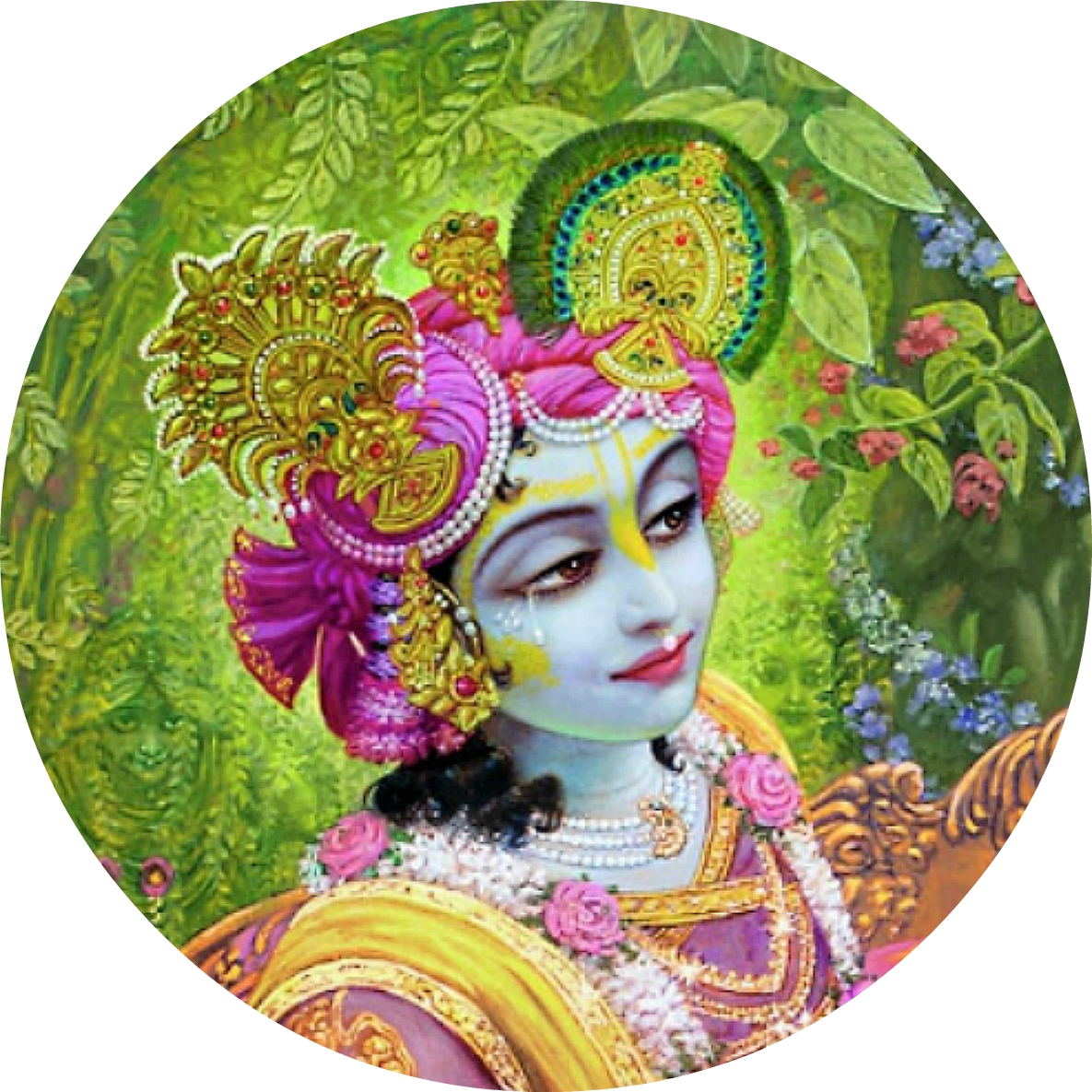

Chapter 1 from the book, The Nectar of Govinda-līlā, 4th edition (Second Printing), by Śrīla Bhaktivedānta Nārāyaṇa Mahārāja
Maṅgalācaraṇa
(oṁ) ajñāna-timirāndhasya
jñānāñjana-śalākayā
cakṣur unmīlitaṁ yena
tasmai śrī-gurave namaḥ
I offer my most humble prostrated obeisances unto the spiritual master, who has opened my eyes, which were blinded by the darkness of ignorance, with the torchlight of knowledge.
vāñchā-kalpa-tarubhyaś ca
kṛpā-sindhubhya eva ca
patitānāṁ pāvanebhyo
vaiṣṇavebhyo namo namaḥ
I offer obeisances to the Vaiṣṇavas, who just like desire trees can fulfil the desires of everyone and who are full of compassion for the conditioned souls.
namo mahā-vadānyāya
kṛṣṇa-prema-pradāya te
kṛṣṇāya kṛṣṇa-caitanya-
nāmne gaura-tviṣe namaḥ
I offer obeisances to Śrī Caitanya Mahāprabhu, who is Kṛṣṇa Himself. He has assumed the golden hue of Śrīmatī Rādhikā and is munificently distributing kṛṣṇa-prema.
he kṛṣṇa karuṇā-sindho
dīna-bandho jagat-pate
gopeśa gopikā-kānta
rādhā-kānta namo ‘stu te
I offer obeisances to Śrī Kṛṣṇa, who is an ocean of mercy, the friend of the distressed and the source of all creation. He is the master of the gopas and the lover of the gopīs headed by Śrīmatī Rādhikā.
tapta-kāñcana-gaurāṅgi
rādhe vṛndāvaneśvari
vṛṣabhānu-sute devi
praṇamāmi hari-priye
I offer obeisances to Śrīmatī Rādhikā, whose complexion is like molten gold and who is the queen of Vṛndāvana. She is the daughter of Vṛṣabhānu Mahārāja and is very dear to Śrī Kṛṣṇa.
hā devi kāku-bhara-gadgadayādya vācā
yāce nipatya bhuvi daṇḍavad udbhaṭārtiḥ
asya prasādam abudhasya janasya kṛtvā
gāndharvike nija-gane gaṇanāṁ vidhehi
O Devī Gāndharvikā, in utter desperation I throw myself on the ground like a stick and with a choked voice humbly implore You to please be merciful to this fool and count me as one of Your own.
aṅga-śyāmalima-cchaṭābhir abhito mandīkṛtendīvaraṁ
jāḍyaṁ jāguḍa-rociṣāṁ vidadhataṁ paṭṭāmbarasya śriyā
vṛndāraṇya-nivāsinaṁ hṛdi lasad-dāmābhir āmodaraṁ
rādhā-skandha-niveśitojjvala-bhujaṁ dhyāyema dāmodaram
Whose dark bodily lustre is millions of times more beautiful than the blue lotus flower, whose refulgent yellow garments rebuke the radiance of golden kuṅkuma, whose residence is Śrī Vṛndāvana-dhāma, whose chest is beautified by a swinging vaijayantī garland and whose splendorous left hand rests upon the right shoulder of Śrīmatī Rādhikā – I meditate upon that Śrī Dāmodara.
bhaktyā vihinā aparādha-lakṣyaiḥ
kṣiptāś ca kāmādi taraṅga madhye
kṛpā-mayi tvaṁ śaraṇaṁ prapannā
vṛnde numaste caraṇāravindam
Devoid of devotion and guilty of committing unlimited offences, I am being tossed about in the ocean of material existence by the turbulent waves of lust, anger, greed and so forth. Therefore, O merciful Vṛndādevī, I take shelter of you and offer obeisances unto your lotus feet.
gurave gauracandrāya
rādhikāyai tad-ālaye
kṛṣṇāya kṛṣṇa-bhaktāya
tad-bhaktāya namo namaḥ
I offer obeisances to the spiritual master, to Śrī Gauracandra, to Śrīmatī Rādhikā and Her associates, to Śrī Kṛṣṇa and His devotees, and to all Vaiṣṇavas.
vairāgya-yug-bhakti-rasaṁ prayatnair
apāyayan mām anabhīpsum andham
kṛpāmbudhir yaḥ para-duḥkha-duḥkhī
sanātanas taṁ prabhum āśrayāmi
I was unwilling to drink the nectar of bhakti possessed of renunciation, but Śrī Sanātana Gosvāmī, being an ocean of mercy who cannot tolerate the sufferings of others, made me drink it. Therefore I take shelter of him as my master.
śrī-caitanya-mano-’bhīṣṭaṁ
sthāpitaṁ yena bhūtale
svayaṁ rūpaḥ kadā mahyaṁ
dadāti sva-padāntikam
When will Śrī Rūpa Gosvāmī, who has established the mission in this world that fulfils the internal desire of Śrī Caitanya Mahāprabhu, give me shelter at his lotus feet?
yaṁ pravrajantam anupetam apeta-kātyaṁ
dvaipāyano viraha-kātara ājuhāva
putreti tan-mayatayā taravo ’bhinedus
taṁ sarva-bhūta-hādayaṁ munim ānato ’smi
I offer obeisances to Śrī Śukadeva Gosvāmī, who can enter the hearts of all living entities. When he left home without undergoing the purificatory processes such as accepting the sacred thread, his father Vyāsa cried out, “Oh my son!” As if they were absorbed in that same feeling of separation, only the trees echoed in response to his call.
tavaivāsmi tavaivāsmi
na jīvāmi tvayā vinā
iti vijñāya devi tvaṁ
naya māṁ caraṇāntikam
I am Yours! I am Yours! I cannot live without You! O Devī (Rādhā), please understand this and bring me to Your feet.
Chapter One
man-manā bhava
Always think of Me
Recently, by the desire of Bhagavān, we had to leave the holy land of Vṛndāvana for some time, but wherever we go, we always remember Vṛndāvana. The scriptures describe many spiritual places, but in the entire universe there is no place like Vṛndāvana.
He who knows the glories of Vṛndāvana will understand this, and especially one who has received the mercy of Vṛndāvana will understand this. In his Śrī Vṛndāvana-mahimāmṛta, Śrīla Prabodhānanda Sarasvatī has written that Vṛndāvana is our everything, and not just the village of Vṛndāvana, but the entire Vraja-maṇḍala. Especially Nandagrāma, Varṣāṇā, Rādhā-kuṇḍa, Śyāma-kuṇḍa, Girirāja-Govardhana: they are all included within Vṛndāvana. Śrī Kṛṣṇa and His eternal associates have performed pastimes there that are thoroughly unique.
For understanding these things, the instructions of Bhagavad-gītā serve as a foundation. Constructed upon this foundation is the palace of Śrīmad-Bhāgavatam with its twelve floors. There are nine storeys or cantos lower, two storeys or cantos above, and in the middle is the tenth storey, or the Tenth Canto. Inside this there are ninety different kuñjas, which are the chapters of the Tenth Canto. And in the centre of this are five special chambers, which are the five chapters describing the rāsa dance, where Śrī Rādhā and Kṛṣṇa are enjoying amorous pastimes. It appears that Rādhikā is serving Kṛṣṇa, but really Kṛṣṇa is serving Her. As long as the foundation of the instructions of Bhagavad-gītā is not there, we will take a mundane understanding of these topics and everything will be ruined.
In the Gītā (18.65) we find this verse:
man-manā bhava mad-bhakto
mad-yājī māṁ namaskuru
mām evaiṣyasi satyaṁ te
pratijāne priyo ’si me
Absorb your mind and heart in Me, become My devotee, worship Me, offer your obeisances to Me, and then certainly you will come to Me. I make this promise to you because you are very dear to Me.
This is the best of all verses in Bhagavad-gītā. We shouldn’t consider the following verse (18.66) to be the best:
sarva-dharmān parityajya
mām ekaṁ śaraṇaṁ vraja
ahaṁ tvāṁ sarva-pāpebhyo
mokṣayiṣyāmi mā śucaḥ
Give up all forms of religiosity – worldly or otherworldly, bodily or mental, varṇāśrama-dharma, the worship of demigods and goddesses, and even the worship of Nārāyaṇa and Dvārakādhīśa – and come exclusively to My shelter.
Although this is the final verse, and Kṛṣṇa is telling us to abandon our dharma, we may think that some sinful reaction may come to us. But Kṛṣṇa says, “I am responsible for that. I will excuse you from all sins.” Making our parents cry, making our brothers and relatives cry, a wife making her husband cry, a husband making his wife cry, not doing our duty to society, and not following varṇāśrama-dharma is all adharma, irreligious, and sinful reaction will come to anyone who does these things. But Kṛṣṇa says, “I promise that I will at once free you from any sinful reaction.”
The verse that we will describe here, “man-manā bhava…”, is even better than this verse. The verse “sarva-dharmān parityajya…” gives instruction for śaraṇāgati, devotional surrender, but this verse gives the fruit of that surrender, and is therefore even more exalted.
When we read the Gītā thoroughly, and especially when we look through the commentaries of our ācāryas, we see that there are five levels of instructions in Bhagavad-gītā. First, there are general instructions for everyone. After this is secret (guhya), then more secret (guhyatara), then most secret (guhyatama), and finally the most secret of all secrets (sarva-guhyatama). These instructions are not given in an expanded form, but in the form of condensed verses (sūtras).
sarvopaniṣado gāvo
dogdhā gopāla nandanaḥ
pārtho vatsaḥ sudhīr bhoktā
dughdhaṁ gītāmṛtaṁ mahat
Bhagavad-gītā-māhātmyam (5)
All the scriptures – the Vedas, Purāṇas, Upaniṣads – are like a cow, and Arjuna is the calf. First the cow feeds a little milk to her calf, and she becomes pacified by that. Then the milkman Śrī Kṛṣṇa can milk the cow, and keep the remainder of the milk aside. Whom is the remainder for? Those that are sudhī, whose intelligence is pure. Whose intelligence is pure? The great scientists and scholars of this world? The Bhāgavatam doesn’t say this. It gives the word sumedhaḥ, and who is sumedhaḥ? A person who performs bhagavad-bhajana, worship of the Supreme Lord Śrī Kṛṣṇa, and who is rasika, expert in relishing the liquid mellows of devotion to the Lord (rasa). One who has decided that engaging in bhagavad-bhajana is the essence of life is purely intelligent, and the rest are fools.
How are they fools? Go-kharaḥ – amongst the animals, the fool is the donkey. When we were coming from Delhi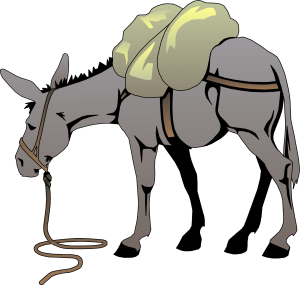 recently, we saw a dog seated on top of a donkey, just looking around. The donkey was just going on its way in a relaxed fashion. Therefore the donkey is a big fool. People load all of their rubbish and heavy things on the donkey, and it carries them. It doesn’t do any work with its front feet, but does everything with its hind legs, such as when it wants to kick someone. If you tell it to go forward it goes backward, and if you tell it to go backward it goes forward. Such a fool it is, and similarly those that don’t perform bhajana of Bhagavān are also fools. And who is intelligent? Only those who engage in bhagavad-bhajana.
recently, we saw a dog seated on top of a donkey, just looking around. The donkey was just going on its way in a relaxed fashion. Therefore the donkey is a big fool. People load all of their rubbish and heavy things on the donkey, and it carries them. It doesn’t do any work with its front feet, but does everything with its hind legs, such as when it wants to kick someone. If you tell it to go forward it goes backward, and if you tell it to go backward it goes forward. Such a fool it is, and similarly those that don’t perform bhajana of Bhagavān are also fools. And who is intelligent? Only those who engage in bhagavad-bhajana.
After the cow has first fed her calf a little milk, Kṛṣṇa keeps the remainder in a pot for those that are sudhī, of pure intelligence, who are dear to Him. Up to here the milk is the instructions of the Gītā, but there is something more: on top of the milk will be the essence, the cream. Churn that, and very soft and beautiful butter will also be produced. Along with the butter also come some things to be discarded. Put the butter on the fire, and in the end, what will we save? Clarified butter, ghee. From ghee we cannot make another thing; it is the essence.
Vyāsa gave Śukadeva the cream and told him, “My son, churn it.” Śukadeva took a churning stick and slowly 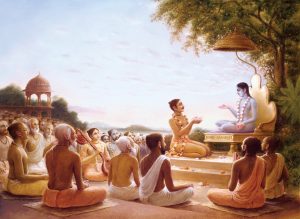 churned until butter was produced. He distributed this butter in the form of the first nine cantos of Śrīmad-Bhāgavatam, but some people said, “We will not take butter; we will accept only the essence of butter.”
churned until butter was produced. He distributed this butter in the form of the first nine cantos of Śrīmad-Bhāgavatam, but some people said, “We will not take butter; we will accept only the essence of butter.”
So to them he gave the remainder of the Bhāgavatam, and therefore the remainder of the Bhāgavatam is so much greater.
What he gave in Śrīmad-Bhāgavatam is apparently nowhere in the Vedas and Upaniṣads, but actually it is there. In what form is it there? Just as there is ghee spread throughout milk, this essence is in the Gītā, Upaniṣads, Vedas, Purāṇas and the Rāmāyaṇa. But taking this milk and then making butter and ultimately ghee is not an ordinary task. In Śrīmad-Bhāgavatam, the five chapters describing the rāsa-līlā, the Gopī-gīta, the Bhramara-gīta (where Rādhā is speaking to a bumblebee in the madness of separation from Kṛṣṇa) and the Uddhava-sandeśa (where Kṛṣṇa sends Uddhava to Vṛndāvana with a message for the gopīs) are the beautiful ghee that he made. And to whom in this world did he give it? He didn’t give it to unqualified people, but exclusively to those who were qualified.
For ordinary people, Bhagavān Śrī Kṛṣṇa has said:
yuktāhāra-vihārasya
yukta-ceṣṭasya karmasu
yukta-svapnāvabodhasya
yogo bhavati duḥkha-hā
Bhagavad-gītā (6.17)
Don’t eat or sleep too much, and be regulated in working and recreation, otherwise you will not be able to attain that rare yoga wherein a soul meets his Creator. In this general knowledge, He has given the knowledge that we are not these bodies. Be detached from the desires of the body and don’t act for them.
jātasya hi dhruvo mṛtyur
dhruvaṁ janma mṛtasya ca
Bhagavad-gītā (2.27)
One who has taken birth will certainly die, and afterwards he will certainly take birth again. Arjuna was crying for everyone – for his son, wife, relatives, friends – and we are also crying for this.
aśocyān anvaśocas tvaṁ
prajñā-vādāṁś ca bhāṣase
gatāsūn agatāsūṁś ca
nānuśocanti paṇḍitāḥ
Bhagavad-gītā (2.11)
Those who are wise despair neither for the living nor for the dead. Everyone will die, and those that don’t go today will go tomorrow or the next day. Don’t cry or worry for them, because inside the body is the soul.
nainaṁ chindanti śastrāṇi
nainaṁ dahati pāvakaḥ
na cainaṁ kledayanty āpo
na śoṣayati mārutaḥ
Bhagavad-gītā (2.23)
The soul cannot be harmed by any weapon, burnt by fire, moistened by water or withered by the wind. The soul is eternal, but the body is subject to death, so don’t be overly concerned about the body.
Yes, a man can worry for it like this: after becoming enlightened, and realising that Bhagavān has given this body in the form of a temple and for the purpose of performing bhajana, it should be cared for. We should keep it clean and repair it, because otherwise we won’t be able to do bhajana. Up to here, caring for the body is all right, but it should be done with a spirit of detachment. In the end Bhagavān will ask for it back, and it must be returned. He will ask, “I have given you such a rare and valuable human form, and what have you done with it?”
Therefore He has spoken verses like this:
yā niśā sarva-bhūtānāṁ
tasyāṁ jāgarti saṁyamī
yasyāṁ jāgrati bhūtāni
sā niśā paśyato muneḥ
Bhagavad-gītā (2.69)
While ordinary people sleep, the sage is awake in self-realisation, and while the sage sleeps, ordinary people are awake in sense gratification. Therefore you should simply engage in bhagavad-bhajana and, considering happiness and distress to be the same, go on doing your duty. Up to here it is general instruction.
After this comes guhya, secret instruction, which is brahma-jñāna. The soul (ātmā) is brahma, spiritual by nature.
sthita-prajñasya kā bhāṣā
samādhi-sthasya keśava
sthita-dhīḥ kiṁ prabhāṣeta
kim āsīta vrajeta kim
Bhagavad-gītā (2.54)
Arjuna asks, “What are the symptoms of a person whose consciousness is absorbed in spirituality? How does he speak, how does he sit and how does he walk?”
In the eighteenth chapter the conclusion is given:
brahma-bhūtaḥ prasannātmā
na śocati na kāṅkṣati
samaḥ sarveṣu bhūteṣu
mad-bhaktiṁ labhate parām
Bhagavad-gītā (18.54)
One who is situated in Brahman sees spirituality everywhere, and he thinks, “I am also Brahman.” Thinking such he will meditate on Brahman, and will not experience happiness or distress. He remains steady through whatever comes to him, and merges his consciousness in Brahman.
karmaṇy evādhikāras te
mā phaleṣu kadācana
Bhagavad-gītā (12.5)
Go on doing your duty and don’t desire the fruits of your labour. In an ordinary way, this is brahma-jñāna.
After this comes guhyatara, more secret, which is paramātma-jñāna, knowledge of the Supersoul. There are two classes of beings, fallible (kṣara) and infallible (akṣara), and then there is Puruṣottama. Bhagavān is Puruṣottama, who resides in the hearts of all living entities in the size of a thumb. Meditate on Him, and if you don’t reach Him, try again. Again not reaching Him, try again.
kleśo ‘dhikataras teṣām
avyaktāsakta-cetasām
Bhagavad-gītā (12.5)
That formless Brahman that I mentioned to you before – don’t go there! Beware! There will be more difficulty in trying to attach your consciousness to something formless. Instead, meditate on the Paramātmā within the heart, and one who connects with Him is a real sannyāsī and a real yogī.
sa sannyāsī ca yogī ca
na niragnir na cākriyaḥ
Bhagavad-gītā (6.1)
One does not become a real sannyāsī just by performing fire sacrifices, or by muttering “ahaṁ brahmāsmi”. This is all guhyatara, more secret.
And guhyatama, most secret, is given in the ninth chapter. Pure bhakti is given there, but it is devoid of rasa. Although it is pure bhakti, it is not full of rasa.
At the end of the eighteenth chapter sarva-guhyatama, the most secret of all secrets, is given. It is full of rasa, and is the highest limit of bhakti:
sarva-guhyatamaṁ bhūyaḥ
śṛṇu me paramaṁ vacaḥ
iṣṭo ’si me dṛḍham iti
tato vakṣyāmi te hitam
man-manā bhava mad-bhakto
mad-yājī māṁ namaskuru
mām evaiṣyasi satyaṁ te
pratijāne priyo ’si me
Bhagavad-gītā (18.64-65)
“Because you are very dear to Me, I am telling you this most hidden of all instructions.” What is that instruction? Before this, Śrī Kṛṣṇa had explained up to the worship of Nārāyaṇa, which is worship of Bhagavān but with awareness of His opulences. However, in this verse, four extraordinary activities are described. The first is man-manā bhava, always think of Me; the second is mad-bhakto, become My devotee; the third is mad-yājī, worship Me; and the fourth is māṁ namaskuru, offer obeisances to Me. If you cannot do the first, then do the second. If you can’t do that, then do the third. If you can’t do that, then just offer obeisances, and everything will come from that.
Now we will speak on the first part of this verse: “man-manā bhava – absorb your mind and heart in Me.” This is not a simple thing. For a man to absorb his mind in any one activity, then his eyes, ears, nose and all his senses must be completely centred on that. If the mind cannot concentrate on something, it is more or less uncontrolled. Sometimes our mind is pondering sense enjoyment, and sometimes we think about Kṛṣṇa. This is the conditioned state. But if someone’s mind is fully absorbed in the lotus feet of Bhagavān, then that is the highest form of worship. When will this be possible? In the beginning stage of śraddhā, faith, it is not possible. Then the stage of ruci, taste, will come, and still it won’t be possible. After this we can really begin to give our heart. In the stage of āsakti, spiritual attachment, we can give perhaps one-half of our heart to Him. In the stage of bhāva, devotional ecstasy, maybe we can give three-quarters of our heart to Him, but only in the stage of prema, divine love, can we fully give our hearts to Kṛṣṇa.
Therefore, when Kṛṣṇa was sending Uddhava to the gopīs in Vṛndāvana, in a clever way, not straight but  crookedly, He told Uddhava, “Uddhava, My mother and My father are very upset for Me. You go and give them My message and console them a little.”
crookedly, He told Uddhava, “Uddhava, My mother and My father are very upset for Me. You go and give them My message and console them a little.”
Uddhava waited there for a moment and then said, “Is there anything more?”
Kṛṣṇa thought, “What will I tell him and not tell him?” He became a little worried. After deliberating, He concluded, “If I don’t tell him now, when will I tell him?”
He said, “Yes, there is one thing. There in Vṛndāvana are the gopīs, who are the most dear to Me. They have given Me their entire hearts, and besides Me they know nothing. For Me they have forgotten all of their bodily needs and bodily functions. What is the condition of someone who has forgotten all bodily needs? They have forgotten eating and drinking, bathing and decorating themselves with ornaments and clothing, and fixing their hair. Their bodies will certainly have become thin and weak, and just see how for Me they have forgotten all of their bodily relations: husbands, sons, friends, brothers, wealth and property. They have no love for anyone but Me, and day and night they are deeply remembering Me. Uddhava, in this world you have not seen such an example of how one person can give their heart to another. Somehow or other they are holding onto their lives.
Their life-airs have risen up to their necks, and how much longer can they live like this? I don’t know if they can be saved or not. Therefore go quickly, and save their lives. Go and give them My message, that I am definitely coming tomorrow or the next day. For this they are holding onto their lives. They will think, ‘Kṛṣṇa has said that He is coming, and He is incapable of telling a lie.’ Clutching onto this hope, it is as if their lives are hanging on a limb. If the limb breaks, they will fall, meaning they will give up their lives. So go quickly.”
Therefore the gopīs are the perfect example of man-manā bhava. Now listen to an example of how Kṛṣṇa takes someone’s heart. We understand that giving our heart to someone is very difficult, but if instead someone takes our heart, then it becomes very easy. Otherwise we are simply unable to give our hearts. In the Kaṭha Upaniṣad (1.2.23) it says:
nāyam ātmā pravacanena labhyo
na medhayā na bahunā śrutena
yam evaiṣa vṛṇute tena labhyas
tasyaiṣa ātmā vivṛṇute tanūṁ svām
Śrī Kṛṣṇa will select a heart that is dear to Him and then say, “Come, I will take your heart.” Even if we really desire to give Him our heart, it is very difficult, but if He desires to take our heart, then it is possible. But we must make our heart such that when Kṛṣṇa sees us it will inspire greed within Him. The heart must be pure in all ways; if there is any impurity remaining there, He will not take it. But mere purity is also not sufficient; the hearts of so many jñanīs are also pure. We must add some special fragrance that, reaching Kṛṣṇa’s nose, will attract Him. Bhakti-rasa should be flowing in the heart. How does Kṛṣṇa take a heart? The following story will show how.
Kṛṣṇa was taking the cows out to graze for the day in the forests of Vṛndāvana. His bodily complexion was the colour of a dark raincloud, His curly black hair was dangling on His face, and He appeared very, very beautiful and charming. His friends were spread out in the four directions chanting “Sādhu! Sādhu! ” (meaning “Excellent! Excellent!”) and praising Kṛṣṇa, and singing and playing their flutes and horns. As they were going along like this, even the blind people of Vraja would come out to try and see. One would say, “Where are you going?”
Someone would reply, “I am going to have darśana of Śrī Kṛṣṇa. Take my hand, let’s go!” and with great eagerness they would go.
All the people of Vraja surrounded the road to see Kṛṣṇa taking the cows out to graze. Mother Yaśodā and Nanda Bābā were following behind Kṛṣṇa, saying, “My son, come back soon, don’t go too far away!” Time and again Kṛṣṇa told them to return, and finally, when He promised that He would certainly return later in the day, they slowly went back to their home.
There were so many newly married girls there who had just arrived in Vraja to live in the homes of their new 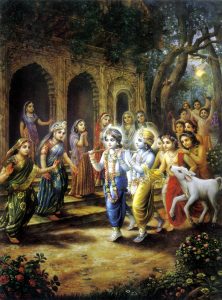 husbands. They all went to the doors of their homes to catch a glimpse of Kṛṣṇa. Some were even peering through vents, some climbed up on their roofs, and others climbed to the tops of trees in the kuñjas.
husbands. They all went to the doors of their homes to catch a glimpse of Kṛṣṇa. Some were even peering through vents, some climbed up on their roofs, and others climbed to the tops of trees in the kuñjas.
Kṛṣṇa was also searching: He always wants to see new girls. In one house, there was a new girl who had just been married two or three days before. She had heard a long time before how marvellously beautiful Kṛṣṇa appears when He is taking the cows out to graze. When she heard Kṛṣṇa coming with the cows, in her heart she became very restless and eager to have His darśana. But her new mother-in-law and sister-in-law were sitting outside the door, and her sister-in-law was especially nasty towards her. They were both telling her, “You are not going! We are going, but you cannot. There is a black snake out there, and if it bites you, you will never be able to remove its poison. Therefore stay in the house! We will be back soon.”
The girl said, “Where are you going? And I will just sit here in the house? I will also go!”
“No, it’s dangerous – don’t go! Your heart is very immature, and you will never be able to remove the snake’s poison. You just sit there.”
“Still I will go with you!”
“No, it’s dangerous! You won’t go.”
“Then I will go alone. All the wives, elderly people, boys, girls, birds, beasts and insects of Vraja are going for darśana of Kṛṣṇa, and in Vṛndāvana I alone will not receive His darśana? Certainly I will go!”
“No, you won’t!”
“I am certainly going! Even if you throw me out of this household I will go!”
Then, seeing that Kṛṣṇa was coming near, the mother-in-law and sister-in-law quickly ran to see. When they left, the girl stepped forward and began peering out through the crack in the door. Her position was such that she could see out, but no one could see her. Kṛṣṇa was holding the flute to His lips and playing so sweetly that it seemed the nectar of His heart was emanating through the holes of the flute and inundating the entire area of Vṛndāvana. Those eyes which have not seen this should be set on fire. Only the eyes which have seen this beautiful scene are successful. The gopīs were offering ārati to Kṛṣṇa not with lamps, but with their eyes. How? Their eyes were like lamps, and the prema in their hearts was like the oil. Their eyes were burning as they circled Kṛṣṇa’s form with loving sidelong glances, and they performed arcana of Kṛṣṇa with these glances. With great happiness, Kṛṣṇa became shy and accepted all of them.
But He was looking in the direction of that one door. Kṛṣṇa may or may not want to see someone, but if someone really wants to see Him, He will certainly see that person. That day He wanted to see that new girl first of all. He wanted to leave everyone else behind and go there immediately, so just then He played a trick with a calf. Grabbing the tail of the calf, He gave it a twist, and the calf ran directly to that door, as if it had been trained for 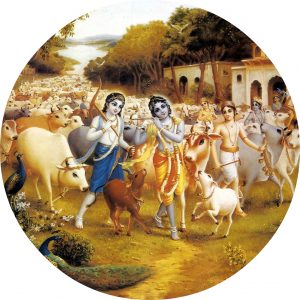 that very purpose. At once Kṛṣṇa and the calf arrived at that door. Standing in His threefold-bending posture, with the flute to His lips, and smiling, He gave His darśana to that girl. Finished! Her very heart came out from her and He took it and went on His way. She could only stand motionlessly. This is taking a heart: man-manā bhava.
that very purpose. At once Kṛṣṇa and the calf arrived at that door. Standing in His threefold-bending posture, with the flute to His lips, and smiling, He gave His darśana to that girl. Finished! Her very heart came out from her and He took it and went on His way. She could only stand motionlessly. This is taking a heart: man-manā bhava.
If someone attains the mercy of Kṛṣṇa, then certainly He will take their heart. If we are especially eager, wondering in our minds, “When will I be able to see the beautiful form of Śrī Kṛṣṇa?” then Kṛṣṇa will be so pleased and come and take our hearts. That girl had performed austerities for millions of years for this opportunity, and that day she became completely successful.
She was left standing motionlessly, and fifteen or twenty minutes passed. Kṛṣṇa had left and entered the forest, and the dust raised by the cows and boys had long settled. She was still standing motionlessly because without her heart or mind, she was helpless. Then the cruel sister-in-law said to her, “The black snake Śyāmasundara has bitten you, and now you will never be able to remove the poison!”
Shaking the girl, somehow she managed to bring her inside the house. “Here! Take this churning stick and churn some yoghurt. By doing some hard work your mind will return to you.” But the girl took the wrong pot, and instead began churning mustard seeds, and it made a terrible noise. Sometimes she would churn, and sometimes she would stop. Where was her mind and heart? Kṛṣṇa had taken them: man-manā bhava.
Again the sister-in-law came, and she said, “Hey! What are you doing? I will go and complain to my mother about you!” At once the mother-in-law came and said, “Lift up this pot. Go and bring water.” They placed a large pot on her head, and on top of that a smaller pot. They also gave her a small child and said, “Look after this child and see that he doesn’t cry!” They put a long rope in her hand to lower the pots down into the well, and sent her off.
Like this she went. Arriving at the well, she made a noose for lowering the pot down into the well. But instead of wrapping the noose around the pot, she put it around the child as if she was going to lower him into the well! Everyone nearby shouted, “Hey! What are you doing?” They came running over, and taking the rope from her 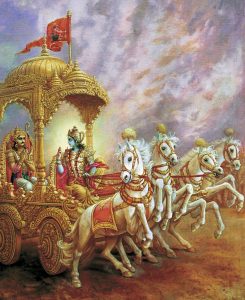 hands, saved the child. One gopī said, “It appears that a ghost has possessed her!”
hands, saved the child. One gopī said, “It appears that a ghost has possessed her!”
Another gopī, who knew everything, said, “It wasn’t just an ordinary ghost, it was the ghost of Nanda!”
Vṛndāvana is the place for those who are unable to give their hearts to their children and family. They leave everyone crying for them and like refugees come to Vṛndāvana and cry exclusively for Kṛṣṇa. Even very fine sons and daughters of kings come to Vṛndāvana, give their hearts to Kṛṣṇa and engage in bhajana.
Kṛṣṇa told Arjuna, “This is man-manā bhava. Absorb your mind in Me as the gopīs did.”
Arjuna replied, “My Lord, this is a battlefield! How is it possible for me to give my heart here? You have told me to fight against Grandfather Bhīṣma, Droṇācārya and Karṇa. I am unable to do it.”
Next He will explain “mad-bhakto – become My devotee.”
Image/Art made possible by Pixabay.com & Krishnapath.org
Source: Purebhakti.com








